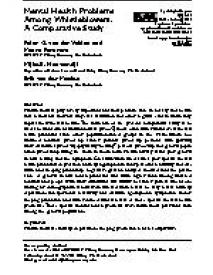Mental Health Problems Among Whistleblowers: A Comparative Study
Whistleblowers play a very important and indispensable role in society and health care sector, but their act may elicit retaliation and other negative effects, which may impact their mental health.
The main aim of the present comparative study is to assess to what extent whistleblowers (N¼27) more often suffer from severe mental health problems than other population-based groups in the Netherlands, i.e., matched controls (N¼135), cancer patients (N¼130), persons with (partial) work disabilities (N¼194), physically ‘‘healthy’’ persons (N¼200), and general population (N¼1026), using the 36-Item Short-Form Health Survey scales (for general mental health) and the Symptom Checklist-90-Revised scales (for specific mental health problems: depression, anxiety, agoraphobia, interpersonal sensitivity and distrust, and sleeping problems).
Logistic regression analyses showed that the prevalence of general mental health problems was much higher than among matched controls and people with work disabilities but similar to cancer patient when controlling for demographics. About 85% suffered from severe to very severe anxiety, depression, interpersonal sensitivity and distrust, agoraphobia symptoms, and/or sleeping problems, and 48% reached clinical levels of these specific mental health problems. These specific mental health problems were much more prevalent than among the general population.
In: Psychological Reports, eISSN 0033-2941 | 122 | 2 | 632-644
https://doi.org/10.1177/0033294118757681
Article first published online: February 16, 2018 ; CC-BY-NC


